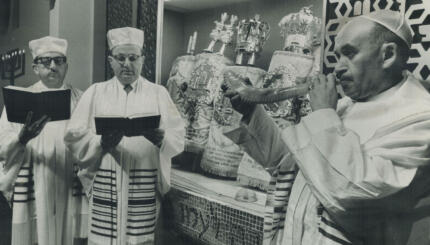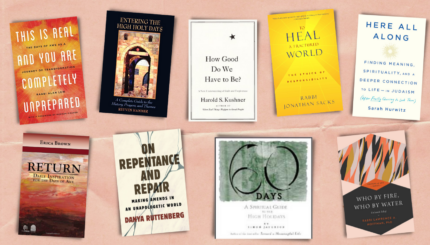In the week leading up to Rosh Hashanah, for our pre-Selichot service study and discussion, I presented the animated shorts of Hanan Harchol, found at www.jewishfoodforthought.com Not only are these charming, they are wonderfully thought-provoking, and generated a great deal of conversation. We watched ‘Forgiveness’ first (Click here to watch).
I will speak for myself when I say that, despite my understanding that forgiveness is creating an internal change that allows another person’s acts to no longer keep a grip on my thoughts and emotions – to, as we hear in the animation, no longer let someone ‘live rent free in my head’ – it is an incredibly difficult thing to do in practice. At times, often unexpectedly, I find myself replaying painful scenes from my life when someone’s words hurt me, or I felt wronged, or someone acted in a way that was dismissive or condescending toward me. I have no desire for these scenes to occupy space in my memory banks. But they seem to have an uncanny ability to maintain their grip.
Mindfulness practices can help combat the power of these thoughts. While I may not be able to neutralize them completely, a greater self-awareness can at least enable me to notice when my mind is in that place, and I can then consciously let it go and try to clear the picture in my head. Sometimes that is as good as it gets. I don’t believe that forgiveness is a one-time thing. It is a process that we need to repeat over and over when a particular moment of our past swims back into view, churning up old emotions with it. And then, perhaps, over time, the more we find ourselves able to notice and dismiss the memory and observe rather than be drawn in by the emotions, the more we are able to neutralize the intensity of the memory when it arises the next time.
Why is it so important to forgive? I’ve been thinking a lot during my preparations and sermon-writing for the High Holydays, that our entire orientation to life – our outlook, our motivation to engage in purposeful acts in the world that make a difference to the community we live in, and the ways that we engage with others on a day-to-day basis, are all driven by the things that we marinate our minds in. There are many ways that we can marinate the mind in something that is burning with negativity. Painful memories from the past are some of the ways. And I know that, for me, when those memories arise, I feel myself get tense and my teeth grit, and my brow furrows, and I’m more likely to be sharp with someone or impatient, and I’m more likely to want to shut myself off from interactions and just hibernate in my own, private space.
But when I do those things, how can I make a positive difference in the world? How can I contribute in a meaningful way to the life of my family, friends, or community? How can I be open enough to give and receive love, to act compassionately, to create space for a different kind of interaction next time around?
Forgiveness is the key. When we read Jonah on afternoon, that is the message. Jonah wants to see strict justice applied to Nineva. When we dredge up past scenes of hurt, isn’t that what we want? We want to know that person got their comeuppance. We want to know that someone gave them as good as they gave. We want to see them fail at something. But what does that achieve? If we recognize that when we feel miserable we are less likely to do good in the world, why would we hope for someone else’s misery? Yes, there are times when acts are committed that require societal justice to be done. But, on an individual level, forgiveness and legal justice are compatible and can co-exist, because one is an internal state of mind, while the other is a social system for maintaining some controls over the worst excesses of human behavior.
Forgiveness is the key.
This piece was originally published at Rabbi Gurevitz’ blog, ‘Raise it Up’ at http://shmakoleinu-hearourvoices.blogspot.com



